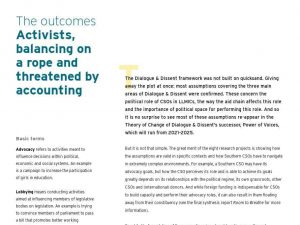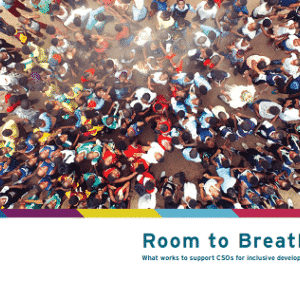 Fabio Bracht via Unsplash
Fabio Bracht via Unsplash
The ‘Assumptions programme’, better known as ‘New Roles of Civil Society Organizations (CSOs) for Inclusive Development‘, ran from 2018 – 2020 and investigated the assumptions of the Theory of Change underlying the Dutch Ministry of Foreign Affairs’ civil society policy framework ‘Dialogue & Dissent’. Though the NWO-WOTRO funded programme’s official trajectory may have ended, the findings from the individual projects within the programme remain relevant and provide a basis for further research that is forthcoming.
This research update lists some of the scientific papers that build on the New Roles of CSOs for Inclusive Development projects’ work:
2021 published research papers
July – December:
Associated research project: Civil society engagement with land rights advocacy in Kenya. By Maaike Matelski, Selma Zijlstra, and Luuk van Kempen. While INGOs are known for having to balance competing demands in their quest for legitimacy, this article discusses a similar balancing act for local organisations working directly with communities in the field. Building on the social constructivist view that legitimacy is actor and context dependent, this article examines how various parties perceive the legitimacy of three land rights advocacy organisations in Kenya. While regulatory and cognitive legitimacy have societal relevance, the authors of the article found them to be of secondary importance to local communities, who primarily value pragmatic and political legitimacy sources such as adequate representation, demonstrable output, responsiveness, and visibility in the field.
Associated research project: CBOs within the official development aid system in Kenya. By Tara Saharan and Lau Schulpen. Restrictive abortion laws resulting in unsafe abortions form one of the key causes of maternal morbidity and mortality in Kenya. Despite the existence of several Women’s Rights Organisations (WROs), advocacy for safe abortions against restrictive laws does not have the momentum the subject deserves. This research draws on agenda-setting literature to explore factors that impede advocacy initiatives of WROs against restrictive abortion laws in Kenya. Using qualitative methods, the article shows that women’s rights agenda results from existing societal norms, funding priorities, state legislation, and lack of solidarity among WROs.
January – June:
Associated research project: Civil society advocacy collaborations in India
By Suparana Katyaini, Margit van Wessel, and Sarbeswar Sahoo. This article focuses on development organizations’ construction of representative roles in their work at the environment–development interface and on implications of these constructions for inclusiveness. The article
shows how development organizations in India contribute to inclusive development
by representing groups that are vulnerable to disaster risk in diverse ways.
Associated research project: Civil society advocacy collaborations in India
By Reetika Syal, Margit van Wessel and Sarbeswar Sahoo. Many CSOs shape their roles through collaborative relations with government. Drawing on interviews with state agencies and CSOs, this article analyes state–CSO collaboration in the restricted civic space context of disaster risk reduction in India. This article stresses interplay and agency, moving away from simple understandings of co-optation, and calling for a more differentiated approach to the study of state–civil society collaboration.
Associated research project: Civil society engagement with land rights advocacy in Kenya
By Tara Saharan, Maaike Matelski and Emmanuel Kumi. This article discusses organizational access as a multifaceted process, Drawing on a systematic comparison of research experiences with advocacy NGOs in Kenya. Based on three case studies that were comparable in set-up and context but yielded different outcomes, we argue that the process of obtaining and maintaining access to NGOs is influenced and shaped by researcher positionality, internal and external gatekeepers, organizational characteristics and research topic, and that these factors should be studied in interaction rather than in isolation.
2020 published research papers
July – December:
- How does organizational capacity contribute to advocacy effectiveness? Taking stock of existing evidence.
Associated research project: Enabling rules for advocacy in Kenya
By W Elbers & J Kamstra. The article disentangles the abstract notion of advocacy capacity into concrete components, with eight core advocacy capacities identified: the capacity to (1) produce evidence, (2) inspire trust among power holders, (3) represent constituency interests, (4) analyse the political arena, (5) produce tailored messages, (6) work collectively, (7) build rapport with power holders, and (8) adapt to ongoing changes in the environment. Finally, the article reflects on the promises and pitfalls of using the capacity framework in real-world settings.
- CSO s in Sustainable Development in Ethiopia: Past Practices and New Trajectories.
Associated research project: CSOs in sustainable development in Ethiopia
N Broeckhoven, D M Gidey, K Tafere Reda, D Townsend, and J Verschuuren. We researched how CSO s working in the area of sustainable development responded to regulatory restrictions on advocacy work using Ethiopia as a case study. We found that the restrictive laws had a severe impact: many CSO s had to shut down or limit their operational capacity to service delivery only. (read more via link above).
- Negotiating autonomy in capacity development: Addressing the inherent tension
Associated research poject: Civil society advocacy collaborations in India
By B Rajeshwari, N Dea & M van Wessel. In this article, we argue that this tension can be addressed when capacity development is set up to advance what we call “narrative autonomy”. Narrative autonomy centers on individuals’ narrative interpretations as they reveal or create the meaning of their own identity and situation, creatively draw on available materials, and discern courses of action true to these interpretations.
January – June:
- Civil Society Against Corruption in Ukraine: Pathways to Impact.
Associated research project: Civil society against corruption in Ukraine
By M Bader, O Huss, A Meleshevych & O Nesterenko. Drawing on a comprehensive study of anti-corruption activism in the regions of Ukraine, this article asks how these insights relate to anti-corruption activism in the regions of Ukraine.
- Negotiating autonomy in capacity development: Addressing the inherent tension.
Associated research poject: Civil society advocacy collaborations in India
By B Rajeshwari, N Deo, M van Wessel. This article highlghts that informal processes lay a foundation for capacity development; redefines the relationship between autonomy and capacity development; tensions between capacity development and autonomy can be addressed in program design; building autonomous identity and actions is a long process needing long-term support.
-
Complementarities in CSO collaborations: how working with diversity produces advantages
Associated research poject: Civil society advocacy collaborations in India
By Margit van Wessel, F Naz and S Sahoo. The article considers the implications for understanding complementarity in broader CSO collaborations.






